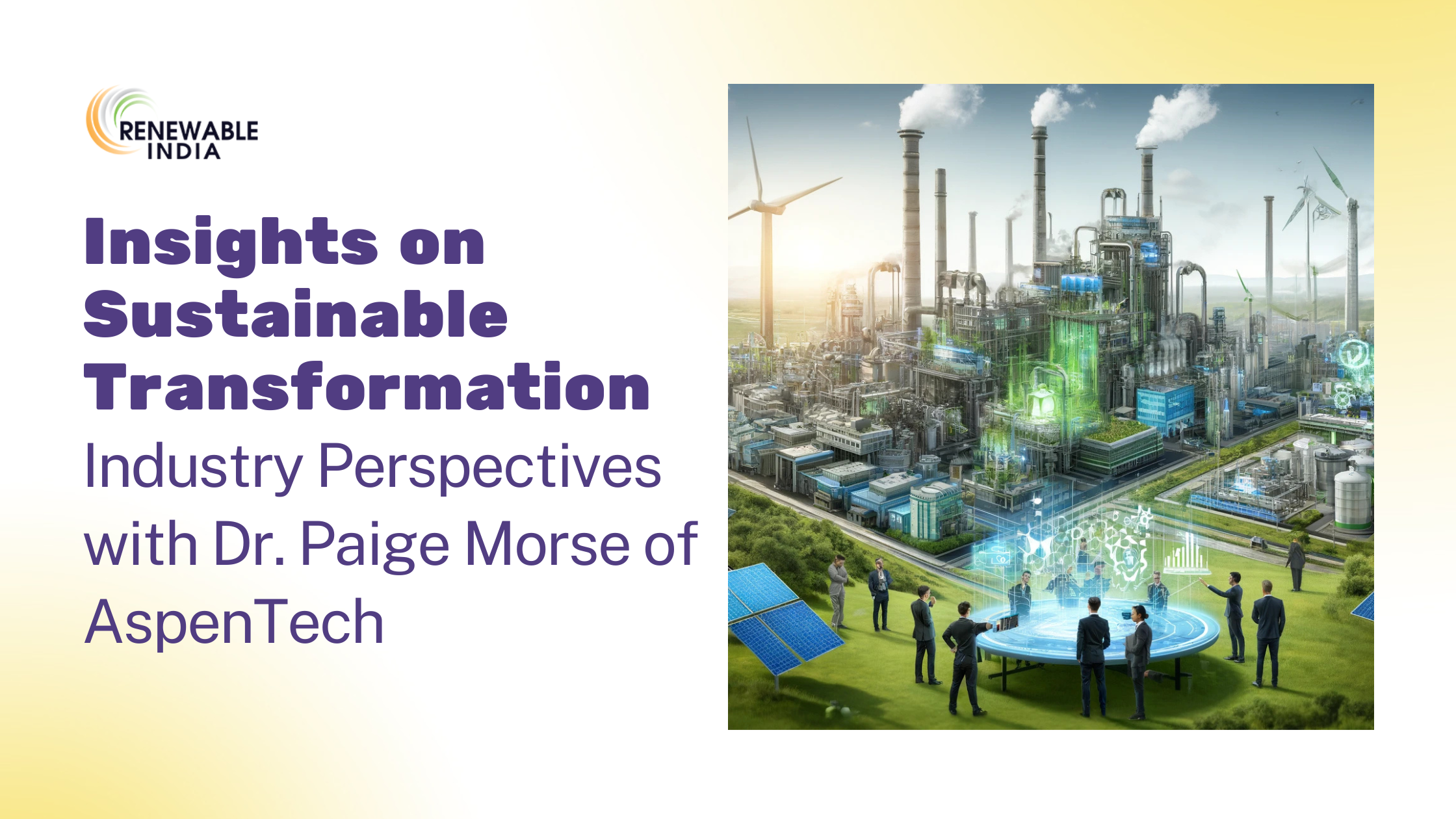
As industries face the pressing need to balance growth with environmental responsibility, AspenTech emerges as a leader in driving sustainability and innovation, especially in asset-intensive sectors like chemicals, plastics, and energy. In an in-depth conversation with Dr. Paige Morse, AspenTech’s visionary approach toward circularity, net-zero goals, and collaborative efforts in energy transformation reveals how digital solutions and cross-industry partnerships are reshaping the path forward. Explore AspenTech’s initiatives, strategies, and the pivotal role of technology in fostering a sustainable future.

AspenTech focuses on innovation for sustainability. For example, today’s dual challenge of meeting the rising demand for resources, while delivering on the expectations of a healthier planet requires new levels of efficiency and innovation. The company’s Industrial AI solutions help operating companies conserve energy, minimize environmental impact and reduce waste and emissions. Over the next two decades, sustainability will take centerstage, as industries such as energy, chemicals and power sectors implement their strategies to succeed through the transformation of energy and materials systems. The impact of climate change is now top of mind, as lives and livelihoods, businesses and communities are uprooted, and the world demands that industry responds.
The circular economy approach demands a complete rethinking of current operations and logistics, connecting disparate value chains to enable efficiencies and material recovery and reuse. This is a fundamentally challenging task for the industry, as it requires a major mindset shift from current siloed approach. The circular economy will require industry to stop seeing used materials as something to dispose of, but instead as feedstock that can be utilized in another value chain. AspenTech focuses on helping customers make these connections, which can include convening user events, where customers can share their stories and engage with industry, as well as with supply chain and simulation solutions to build robust recovery systems and new recycling processes.
Sustainability can be both an opportunity and a necessary requirement for asset-intensive industries. Regulations are growing across regions requiring companies to track and lower emissions and waste from their processes. As products move across the globe, local regulations become relevant across entire supply chains even as products may come from locations with fewer regulations. Additionally, the increasing focus on reducing Scope 3 emissions, which include supplied products, encourages all companies to work on emissions reduction to maintain business opportunities.
Considering opportunities, many companies are turning to co-innovation to jointly discover new solutions to sustainability challenges. The industrial space is well-positioned to capitalize on co-innovation and help the world navigate the energy convergence. In the downstream industry, operators now need to think beyond traditional crude supplies – to also consider bio-based feedstocks and even mining to produce metals and minerals that are crucial for battery production. It is also necessary to consider the additional electrification of industrial operations to lower emissions associated with renewable energies.
The energy transition is driving major change in the chemical industry, both for energy use and raw material supply. Chemical companies are large energy users so many have been working to develop new low carbon energy sources to meet their needs, such as on-site solar panels. Chemical companies have the right skills to develop new processes that use carbon dioxide as a raw material for new products. AspenTech views the deployment of digital technology as mission-critical, in helping innovators develop new processes to convert CO2 into useful products, such as methanol, which is a very important starting material for the chemical industry.
The chemicals’ industry will need to put significant emphasis on collaboration, as many chemicals manufacturing processes depend on crude feedstocks and consume a significant amount of energy. In some regions, this sector is the largest energy consumer in the industrial space. To mitigate this huge energy consumption, nuclear sources – as Dow is planning in Texas, becomes a possibility.
Collaboration will be critical to enable industry to move forward faster, as companies share resources and collectively balance the opportunity and risk of implementing new low-carbon technologies.
As the world shifts to new energy sources and away from crude oil, chemical companies will lose access to feedstocks for some of the largest volume chemicals. Recycled materials, such as used plastics, will cover some of this gap through advanced recycling, but many companies will need to shift to bio-based and CO2-based processes. AspenTech is committed to aiding this new development and offers useful starting points to help researchers make quick progress in this effort.
Some success stories already exist, such as Braskem I’m Green products, but much more action and larger scale is needed to address this gap. Digital simulation is helping several companies develop new bio-based processes that have a lower carbon footprint than those that are fossil-fuel based.
AspenTech engages the industry through associations and memberships. One important example is the Alliance to End Plastic Waste, which connects participants across the plastics value chain to build collaborations to facilitate materials recovery and recycling programs. The underlying driver for how fast the circular economy can take off depends on how quickly connections can be forged across industries, and how success stories can be shared and implemented across regions. The Alliance has recently developed solution models that can be rapidly implemented and scaled in communities across the globe.
In Asia Pacific, the region is experiencing substantial growth. Lifestyle changes and infrastructure support are required for sustainability progress, especially as the rise of mega middle classes in populous countries, such as India, China and Indonesia drive consumer demand. This makes it more critical to deploy the right technology to level the playing field. Industries can leapfrog in innovation rapidly and should be encouraged to do so, as it can help companies meet this dual challenge.
The Bersih Indonesia project, sponsored by the Alliance to End Plastic Waste, is an important environmental success story that reflects how coordinated support can make significant progress.
The impact of climate change is being seen across the globe, disrupting and destroying lives and livelihoods across all regions. Industrial companies have a large opportunity to use their research and production capabilities to deliver new approaches to energy and materials, using digital technologies to accelerate this progress. And as consumers have more awareness and personal experience with climate and environmental impacts, companies will need to be more responsive to ensure a future license to operate.
I am optimistic we will discover the solutions that are necessary to resolve climate changes issues. We will collaborate to develop the new technologies and implement innovative low-carbon solutions. I think that digital technologies will prove to be an important part of the solutions developed, helping to accelerate development and implementation, and ensuring that flexibility is built into the operating systems.
The large uncertainty for industry is timing – whether collectively we can feel the urgency to move fast enough to avoid major disruptions in lives, markets, etc. Already we are late, as confirmed by missed global climate targets and recent natural disasters correlated to climate change, so this urgency is what we need to avoid deeper calamities.
Leave a Reply